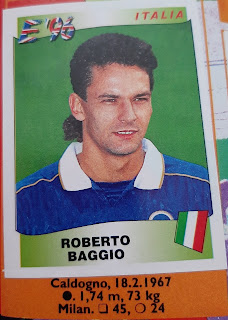35: Tommy Boyd, Scotland, Panini World Cup France 98
Two weeks from today the Scottish men’s national football team will line up to face the Czech Republic in their first tournament finals game since 1998. This time in the international wilderness has been at times heartbreaking and at others embarrassing for the Tartan Army so it is no understatement to say that, whatever the result, the clash with the Czechs will be both cathartic and exciting in equal measure. Especially when you factor in that UEFA’s inter-railing approach to the delayed Euro 2020 tournament means that the game will take place at Glasgow’s Hampden Park.
Things weren’t always so bleak for Scotland when it came to qualifying for major tournaments. Between 1974 and 1998 they only missed out on one World Cup, in the USA in 1994, and, whilst they only managed to make it to the 1992 and 1996 European Championships, it is important to remember that the Euros only expanded beyond a four team tournament in 1980 and even then only expanded to sixteen teams in 1996. They were only denied a place at Euro 2000 after a 2-1 aggregate defeat to ‘The Auld Enemy’ in a play-off and reached a similar stage ahead of Euro 2004. A 1-0 victory over the much-fancied Netherlands at Hampden set them up nicely for the return leg. However, a Ruud van Nistelrooy hat-trick inspired the Dutch to a 6-0 win in Amsterdam. Since then there have been few crumbs of comfort as badly timed defeats to the likes of Macedonia and Georgia have proved costly in subsequent qualifying campaigns.
When Scotland have qualified for the finals they have found luck has deserted them and they are yet to make it beyond the initial group stage in any of their World Cup or European Championship campaigns. At Euro 96 a late Patrick Kluivert goal in the Netherlands’ 4-1 defeat to an Alan Shearer and Teddy Sheringham inspired England meant that they were eliminated on goals scored. Having recovered from this disappointment manager Craig Brown led the Tartan Army to France 98 ahead of a decent Swedish side buoyed by the excellent form of Kennet Andersson and there was once again genuine belief that they could overcome a relatively tough draw in Group A alongside reigning champions Brazil, a Norway side led by Frode Grodas and the attacking flair of Morocco’s Mustapha Hadji.
One of the lucky Scottish players to make the squad for France 98 was Celtic defender and club captain Tom Boyd. The 1997/98 season had been a special one for Boyd as he helped steer the Bhoys to victory in the Scottish Premier Division thus preventing their Old Firm rivals Rangers from winning an historic tenth league championship in a row. As well as leading Celtic to Scottish League Cup glory in the same season he brought tournament experience to the side, having appeared for his country at both Euro 92 and Euro 96, and could play in central defence or at full back. Such success and versatility was not to be sniffed at and Boyd duly donned the traditional tartan along with his team-mates as they set off for Paris.
This being the 1990s there were several World Cup songs of varying quality. Baddiel and Skinner hastily rehashed the words of ‘Three Lions’ to reflect on England’s exit from Euro 96 and Keith Allen teamed up with Alex James of Blur to put together ‘Vindaloo’. Meanwhile England United (the Echo and The Bunnymen, Ocean Colour Scene and Spice Girls supergroup no one asked for) put together the fairly insipid and comparatively unsuccessful ‘(How Does it Feel to Be) on Top of the World’ which earned far more marks for its superfluous punctuation than it did as a song. International representation was provided by Dario G’s ‘Carnaval de Paris’ which answered the longstanding question of “what do steel drums and bagpipes sound like together?” Not wanting to be stranded on the back end of a Eurodance banger Scotland’s riposte came in the form of Del Amitri’s frankly depressing ‘Don’t Come Home Too Soon’. Rather than invoking the spirit of past glories or getting Paul Lambert to rap the middle eight the Scottish soft rockers’ effort implored the national team to at least try and get beyond the group stage. Hardly the rallying call expected or perhaps needed ahead of the opening game of the tournament against Brazil.
Having clearly chosen to ignore Del Amitri’s advice Scotland fell behind to a Cesar Sampaio goal after only five minutes. John Collins levelled the scores from the penalty spot and Scotland did well to repel a Brazilian side brimming with attacking talent until disaster stuck with just over fifteen minutes to play. Cafu’s deflected effort hit Tom Boyd in the chest and looped mournfully past Jim Leighton to give the Selecao victory. A credible draw against Norway meant that victory over Morocco might be enough to see the Tartan Army through. However, an abject 3-0 defeat to Morocco, and Norway’s shock victory over Brazil, meant that Craig Brown’s side were coming home at the soonest possible point and, moreover, would not be back for over two decades.
Tom Boyd currently sits sixth in the all-time Scottish appearance charts with 72 caps between 1990 and 2001. Alongside him in the top ten Darren Fletcher and Kenny Miller made a combined 149 international appearances without ever experiencing a major tournament finals. In the top twenty only goalkeeper Craig Gordon has an outside chance of appearing at this summer’s European Championships but perhaps a younger, fresher side unencumbered with the weight of history might be able to go one better than the likes of Boyd, Kenny Dalglish and Ally McCoist. All that stands in their way are the Czech Republic, Croatia and, of course, the ‘Auld Enemy’ at Wembley Stadium.





Comments
Post a Comment